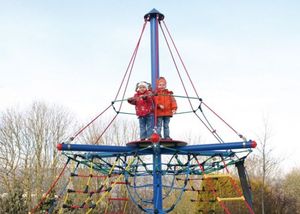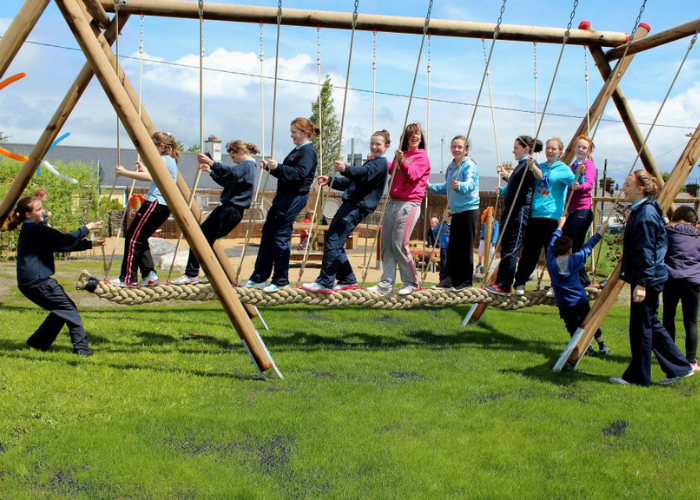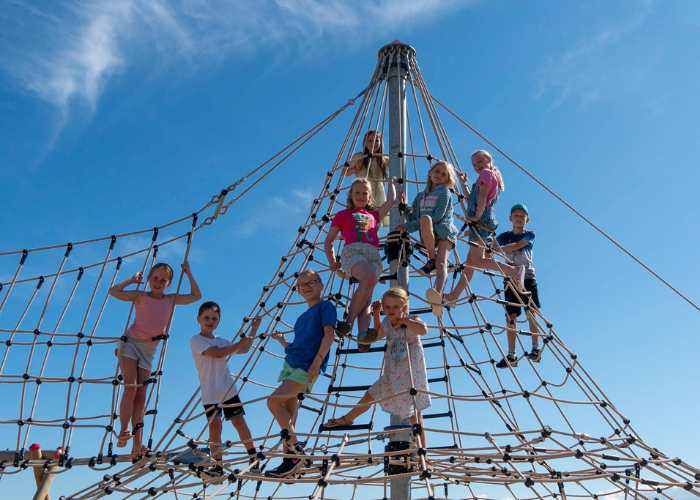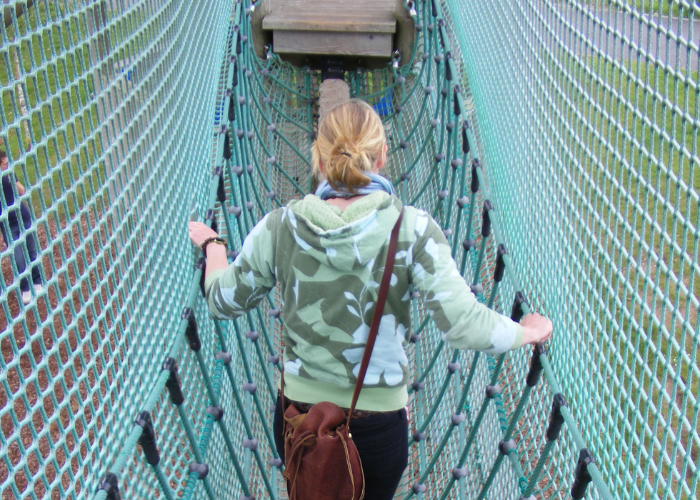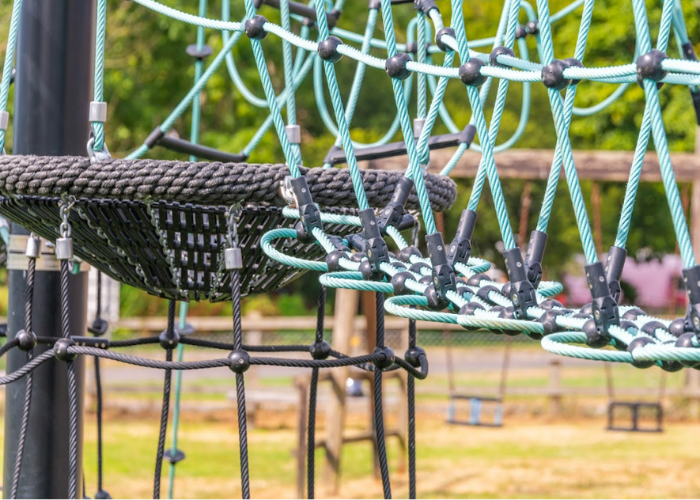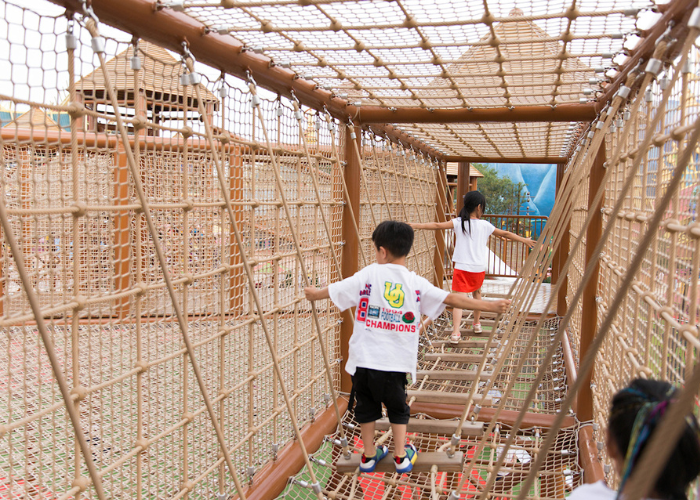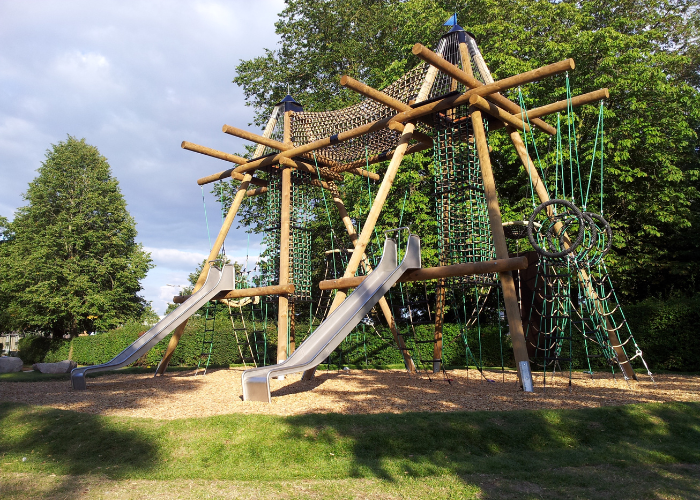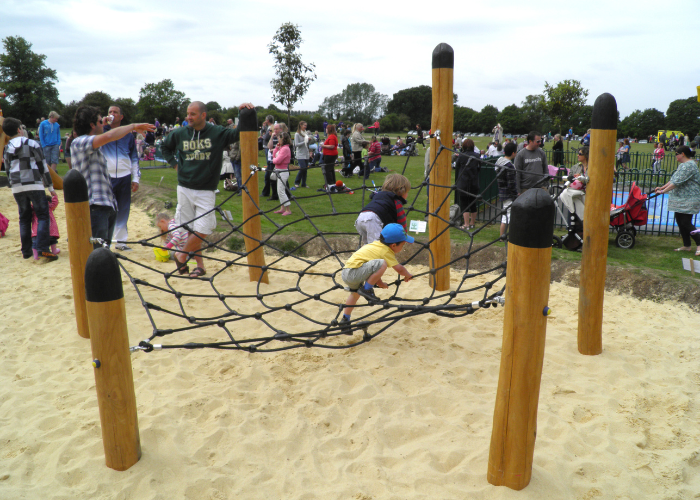What is Adult-Led Play & How Can You Facilitate it in the Playground?
Helping your child learn to navigate the world and play is an important part of their development. As a parent or caregiver, you may have heard the terms "child-led play" and "adult-led play" thrown around in conversations about early childhood education. But what do these terms really mean, and what have they got to do with a playground?
We've all seen children running around a playground, climbing, sliding and swinging with joy. These activities seem to come naturally to them, but there's actually a lot more going on behind the scenes. Play is essential for children's physical, emotional, and cognitive development and can take different forms depending on who is leading it.
Let's dive in and find out how you can facilitate adult-led play at a Huck Play playground.
| Adult-Led Play | Child-Led Play |
|---|---|
|
|
What is Adult-Led Play?
Adult-led play is guided and structured by adults. This type of play involves planned activities or games that are directed by an adult. For example, a parent might guide their child around the playground and help them to overcome challenges and obstacles.
Adult-led play has many uses, including teaching children important skills like teamwork, following instructions, and developing fine motor skills. It also allows adults to introduce new concepts or ideas to children in a fun and engaging way.
The role of the adult in adult-initiated play is to offer children activities that encourage cooperation and positive peer relationships.
How is it Different to Child-Led Play?
In comparison, child-led play is exactly what it sounds like – play that is led by the child. This type of play is unstructured and allows children to explore their environment, make decisions, and use their creativity without adult intervention. It can take many forms, such as imaginative play in playgrounds.
Child-initiated play is important because it allows children to develop independence, self-confidence and problem-solving skills. By exploring on their own and making choices about what they want to do – like what playground equipment they want to play on and how they approach it – children can learn at their own pace and in their own way.
It also gives them a sense of control and ownership over their play, which is essential for their development.
The role of the adult in child-initiated play is to supervise and prevent any safety concerns from arising.
Benefits of Adult-Led Play
Adult-initiated activities have a range of benefits when it comes to child development, particularly in the early years foundation stage. Some of the key benefits include:
- Developing social skills: With adult-led activities, children learn how to interact with others, share and take turns.
- Teaching new cognitive skills: By introducing structured activities, adults can teach children important skills like counting, colour recognition and problem-solving.
- Building confidence: Adult-led play encourages children to try new things and build their self-confidence in a supportive environment.
Linda Thornton, a Lead Officer for Early Years Development with over 40 years of experience, says: “Children learn through first-hand experiential activities with the serious business of ‘play’ providing the vehicle. Through their play, children practise and consolidate their learning, play with ideas, experiment, take risks, solve problems, and make decisions…”
Overall, adult-led play can complement and enhance child-initiated play to provide a well-rounded learning experience for children.
How to Facilitate Adult-Led Play at the Playground
At Huck Play, we believe in creating playgrounds that not only allow for child-led play but also facilitate adult-led activities. Our unique designs incorporate interactive elements, such as swings and rope-play equipment, which can be used for adult-led activities.
Below are some of the best ways to facilitate adult-led play:
Play Simon Says
This is a great way to facilitate adult-led play at one of our playgrounds. You can play this with as many children as you want. This game helps children improve their ability to follow instructions and listen out for those commands that don't feature 'Simon says'.
As the leading adult, all you need to do is say the famous line and then add an action to the end. Some of our favourites include:
- Simon says: climb to the top of the rope pyramid.
- Simon says: bounce 5 times on the trampoline.
- Simon says: run to the blue rope ladder
- Simon says: the first one down the slide is the winner!
Set Out Obstacle Courses
Many of our playground equipment features different characteristics that make the perfect basis for an obstacle course. As the adult leading play, you need to stake out a course from one end of the equipment to the other.
Then, get the children to take it in turns to complete the course. Depending on their ages and abilities, you can time them in to declare a winner. This can be a great way to provide structure to the playground and boost children's self-esteem when they do well.
When playing in a group at the park, this game can also foster some healthy competition between peers.
Set a Climbing Challenge
There are plenty of different ways to climb the playground equipment from Huck Play; it's what makes it so much fun for children. However, adult-led play involves a bit more structure.
Setting a climbing challenge is a great way to help children refine their motor skills and hand-eye coordination. This is another example of adult-led play that can turn into a timed or measured challenge between friends to create positive peer relationships and introduce children to healthy examples of competition.
Some of our favourite climbing challenges include:
- See who can climb highest on the climbing rope
- See who can climb to the top of the Tower Carousel quickest
- See who can complete the Nest Rally without falling off
Set a Cooperative Challenge
Adult-led play isn't just about helping younger children learn about healthy competition and improving their listening skills. It's also a great way to encourage cooperation between peers and provide high-quality experiences of teamwork.
Setting up a cooperative challenge for children at the playground can help turn them into more independent learners and give them resources and control over how the challenge turns out.
Some of our favourite collaborative activities are:
- Balance the Viking Swinger – This is great for practising self-control
- Create equal heights on the Midi Bird's Nest Tree – This is a fun challenge if you have children at different stages of growth. They need to work out where each child should stand to make them all the same height.
Balancing Child-Led & Adult-Led Play at the Playground
Both child-led and adult-led play have their place in a child's development, and a well-rounded playground should offer opportunities for both types. At Huck Play, our playground equipment is designed to provide children with the freedom to explore and make choices while also encouraging structured activities and games led by adults.
For example, our adventure playground equipment is great for child-led play, with natural elements and open-ended play opportunities that allow children to use their imaginations. At the same time, our playground swings are great for adult-led play, as they encourage participation, teamwork and communication.
By providing a balance of child-led and adult-led play options at the playground, we can support children's development in different ways while also fostering a sense of independence and collaboration.
Facilitate Adult-Initiated Play With Huck Play
Here at Huck Play, we are committed to enriching children's play experiences through our high-quality playground equipment. We recognise the importance of both child-led and adult-led play in fostering children's development, and our diverse range ensures that both types of play can be facilitated with ease.
Discover the full range of our equipment at Huck Play, and let's create more joyful playground memories together.
FAQs
Child-led play is unstructured and initiated by the child, allowing them to explore, make decisions, and use their creativity without adult intervention. Adult-led play, on the other hand, involves planned activities or games that are guided by an adult. Both types of play have unique benefits and contribute to a child's holistic development. Adult-led play provides structure and introduces the child to new concepts and skills in a fun and engaging way. It promotes important skills like teamwork, following instructions, and developing fine motor skills. Additionally, adults can introduce new concepts or ideas to children through this type of play. There are several ways to facilitate adult-led play at the playground. You could play games like Simon Says, set out obstacle courses, organise climbing challenges, or set cooperative challenges. These activities can help improve the child's ability to follow instructions, improve motor skills, foster healthy competition, and encourage peer cooperation. Huck Play designs playgrounds that support both child-led and adult-led play. Their equipment encourages children to explore and make choices in a safe environment, promoting independence and creativity. Meanwhile, certain elements of their playgrounds are designed for adult-led activities, fostering participation, teamwork, and communication. Structured activities like obstacle courses benefit children at playgrounds by helping to develop physical stamina, balance, coordination, and cognitive skills. Obstacle courses teach goal-setting, resilience, and problem-solving. They also promote social skills like cooperation and communication.What is the Difference Between Child-Led and Adult-Led Play?
Why is Adult-Led Play Important?
How Can I Facilitate Adult-Led Play at the Playground?
How Does Huck Play Support Both Child-Led and Adult-Led Play?
How Can Structured Activities Like Obstacle Courses Benefit Children at a Playground?

